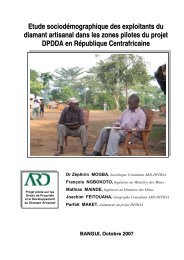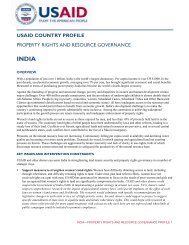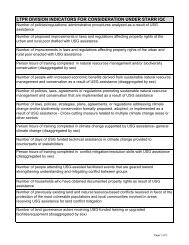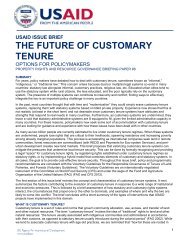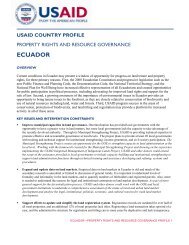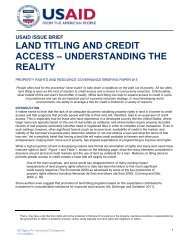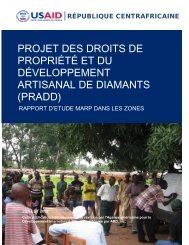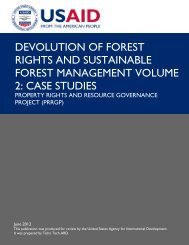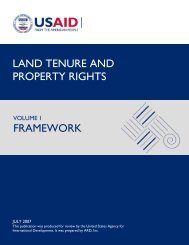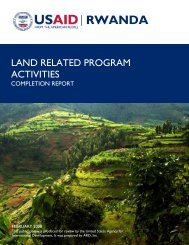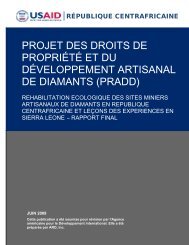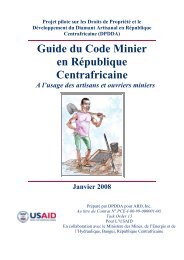(pradd) â liberia - Land Tenure and Property Rights Portal
(pradd) â liberia - Land Tenure and Property Rights Portal
(pradd) â liberia - Land Tenure and Property Rights Portal
- No tags were found...
You also want an ePaper? Increase the reach of your titles
YUMPU automatically turns print PDFs into web optimized ePapers that Google loves.
• Prevents someone from taking my claim: 89.3 percent;• Protects me from conflicts with other miners or people who want the l<strong>and</strong>: 87.3 percent; <strong>and</strong>• I will get a higher price for my diamonds: 78 percent.This means that artisanal miners will feel more secure about their property rights if they have a valid license<strong>and</strong> vice versa. By clarifying property rights, artisanal miners are likely to register <strong>and</strong> obtain a license <strong>and</strong>develop a sense of ownership. In turn, this will foster a culture of stewardship <strong>and</strong> responsible managementof resources.Communities perceive parcels of l<strong>and</strong>, including mining claims, to be the allotted “property” of a specificperson, who is entitled to live, farm, <strong>and</strong> mine there, <strong>and</strong> whose children or spouse can inherit it after hisdeath (different rules apply to women). There are different variations among different communities forcommunity members <strong>and</strong> permitted outsiders to establish their entitlement to a parcel of l<strong>and</strong>, such asplanting a life tree or getting permission from the Chief to plant a life tree (outsiders) after the passing of acertain time.Unsevered minerals are the property of the State, but the ownership of l<strong>and</strong> <strong>and</strong> the resources on l<strong>and</strong> heldcommunally, is unclear. At present, GOL only recognizes formally registered statutory ownership of property.All untitled communal l<strong>and</strong> is considered to be “public l<strong>and</strong>,” except for l<strong>and</strong> under Tribal Certificates, thestatus of which is equally uncertain. The property rights of rural communities have been reduced to userights, with no ownership entitlements <strong>and</strong> thus open to sale or alienation at the government’s discretion. Theright for communities to own l<strong>and</strong> communally should be recognized <strong>and</strong> enshrined in law. MML shouldwork closely with the Cabinet <strong>and</strong> the <strong>L<strong>and</strong></strong> Commission to accomplish this in a meaningful way.There is no definition in law of what exactly “public l<strong>and</strong>” is. 23 For ASDM, it means that anyone can obtain amining license for the piece of l<strong>and</strong> that was granted to them by the Chief or by inheritance. The fact thatcustomary ownership is not recognized causes conflict <strong>and</strong> insecurity of tenure for ASDM <strong>and</strong> diamondmining communities.The question the <strong>L<strong>and</strong></strong> Commission of Liberia has to consider in the process of l<strong>and</strong> reform is whether thereis a legal obligation for GOL to recognize some form of customary ownership in terms of the Constitution,international law, <strong>and</strong> Liberian law. The question that follows is whether it is lawful for GOL to grant privateproperty rights, mineral rights, or other natural resource rights over communal property without the communities’consent.The determination of clear national l<strong>and</strong> use priorities will guide the different actors to establish what theultimate goal of l<strong>and</strong> reform is: to safeguard the interests of industrial entrepreneurs or to allow communitiesto contribute meaningfully to natural resource management <strong>and</strong> their own sustainable development?From a legal point of view, it is important to underst<strong>and</strong> that rights do not just disappear. <strong>Rights</strong> are createdby law, <strong>and</strong> once rights exist, its golden thread flows through history until it is specifically repealed <strong>and</strong> therights expressly extinguished. The 1956 Aborigines Law that governed traditional authority over communallyheld territories was never repealed, but merely omitted from the 1973 codification of Liberian laws. However,it appears to have been replaced by the Amendments to the <strong>Property</strong> Laws 1974. 24 In this law, not by expressrepeal, but by mere omission <strong>and</strong> the creation of new rights instead, the existence of communal propertyrights were “legislated away.”23<strong>Property</strong> Law (LCR29), Section 8.53(a): ‘Except as otherwise provided in Section 8.44, all unclaimed l<strong>and</strong> shall be deemed to be public l<strong>and</strong> untilthe contrary is proved’. And Section 8.123: ‘The registration of l<strong>and</strong> as public l<strong>and</strong>…shall enable such l<strong>and</strong> to be disposed of in accordance with theprovision…in public l<strong>and</strong> law.’24(1973-1978 Codification) Chapter 8 of the Liberian <strong>Property</strong> Law: Registration of l<strong>and</strong>, dealings in l<strong>and</strong> so registered <strong>and</strong> matters connectedtherewith.PRADD LIBERIA: A REVIEW OF THE LEGAL, REGULATORY AND POLICY FRAMEWORKGOVERNING ARTISANAL DIAMOND MINING IN LIBERIA 21



